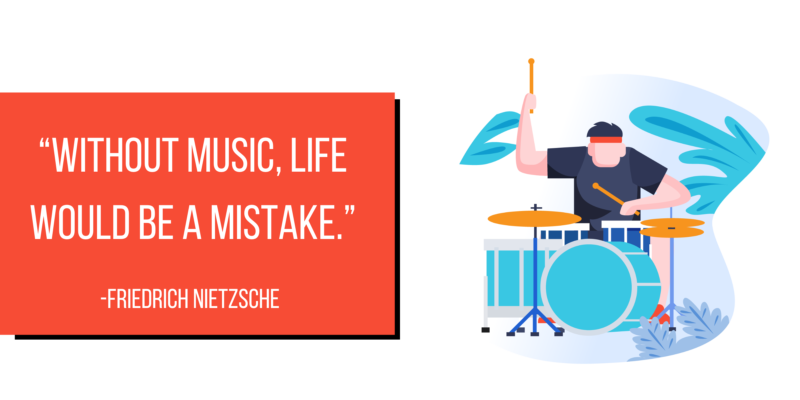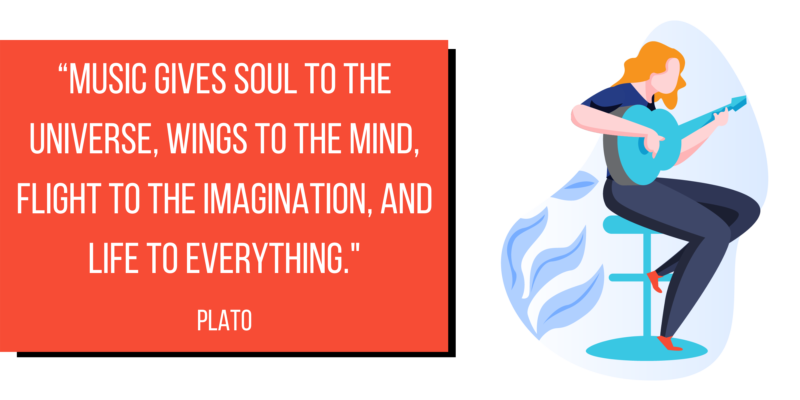Musical instruments, and the desire to play them for ourselves and others is as old as humanity. Literally. Prehistoric flutes made from bird and mammoth bones have been found that date back 42,000 to 43,000 years (for context, Neanderthals went extinct around 30,000 years ago). Archaeologists say that playing music was an important part of socializing and communicating for our prehistoric ancestors. Tens of thousands of years later, playing an instrument serves exactly the same function. Whether you jam with friends, perform in a concert hall, or play your instrument alone and just for yourself, this creative skill is all about connection and expression.

There are plenty of ways to learn to play an instrument, some more structured than others, some more accessible than others. You may see music as a hobby or as a career, or even a little of both. Exploring your options and weighing your priorities can help you decide the best way to learn to play a musical instrument.
Reasons for Learning to Play an Instrument
If you’re naturally musical, the question “why play an instrument?” may be difficult to answer. For some people, making music is as natural- and as essential- as breathing. But many other people take up playing an instrument as a new hobby, to explore their creative side, to express themselves, or to expand their horizons. If you’re considering learning to play a musical instrument, there are many reasons to do so, and benefits to sticking with it, even when learning to play becomes challenging. Knowing the many benefits of learning to play an instrument can keep you motivated and help you appreciate your progress.
Playing an instrument makes you smarter
Research from the University of Zurich found that learning to play an instrument can increase your IQ by seven points.
Playing an instrument lowers your stress
Studies have repeatedly demonstrated that playing an instrument cuts down significantly on stress. In one study at Bryan Memorial Hospital in Lincoln, Nebraska, music “significantly” lowered the heart rate and blood pressure of patients recovering from surgery. Lower stress is associated with a healthier weight, stronger immune system, and even longer life expectancy.
Playing an instrument strengthens your memory
Researchers have demonstrated that playing a musical instrument improves verbal memory, spatial reasoning and even communication skills, probably because it requires you to use both sides of the brain.
Playing an instrument improves your relationships
According to a study published in Frontiers of Psychology, playing music with others forms positive synchronous connections, even if your social connection to them is minimal. A new creative hobby is also one of the best ways to expand your social circle.
Learning to Play an Instrument through Self-Teaching
If you want to learn to play an instrument, the most important thing you can do is to… play that instrument. Just noodling around on your piano or picking out songs from the radio on your guitar can get you up and running. There’s simply no replacement for hands-on trial and error, and the practice and satisfaction that comes from figuring it out on your own. Some of the greatest musicians of all time have been self-taught, especially in the genres of jazz and rock, including:
- Eric Clapton
- Jimi Hendrix
- Dizzy Gillespie
- Keith Moon
- Thelonious Monk
- Prince
- Jack White
- Frank Zappa
- Louis Armstrong
Of course, you’ll need some resources beyond your own hands and ear. Learning to hold, manipulate, and maintain your instrument correctly from the start will save you lots of problems down the line, and some guidance can help you get the most out of your practice. Some of the best resources for learning to play an instrument on your own are:
- Instructional Videos on sites like YouTube
- Introductory Books such as “Playing ___ for Dummies”
- Recorded Lessons on sites such as Lynda
Libraries have instrument playing guide books available, along with sheet music and sometime access to online video lessons through different e-learning platforms.
Self-learning Pros:
- set your own pace
- generally free
- choose your preferred playing style
Self-learning Cons:
- no feedback
- no live technique modeling
- harder to stay motivated
Learning to Play an Instrument through Online Classes
Classes add structure to your learning, and learning to play an instrument is a long game that can become much easier with a bit of structure. While it’s possible to learn Chinese or sculpture in a group setting, lessons in playing an instrument don’t work well in a group setting. If you’d rather avoid the expense of hiring someone for one-on-one lessons in playing an instrument, online classes can give you some much-needed structure at little cost.
Some of the most popular online classes for learning to play an instrument are:
- Coursera
- Udemy
- Allversity
Online classes can also be a good option if you’re interested in exploring an instrument that’s not taught by anyone in your area. Want to learn to play the koto, the washboard, or the sitar? Online classes are an accessible solution.
INSERT SMALL GRAPHIC ICONS: stem-up music note for pros, contrasting color stem-down music note for cons
Online Class Pros:
- higher structure
- step-by-step expert guidance
- technique demonstrations
Online Class Cons:
- some cost
- less flexibility
- no live feedback
Learning to Play an Instrument through Private Lessons

Without a doubt, learning from a pro is the number one way that most people learn to play an instrument. Unlike skills like algebra or even expressive mediums like drawing, music is meant to be experienced and shared live. The fastest way to learn any performing art is through live performance, guided by a teaching professional in real time.
An experienced musician can show you with demonstrations and physical manipulations exactly how to correctly hold your instrument and how to make the desired sounds. They can listen to you play, give live feedback, and listen again, shaping your performance until it’s just right. They can also expose you to new sounds and techniques based on your interests and performance, helping you grow as a musician. You have several options when pursuing music lessons:
- Individual freelance music teachers
- Independent schools of music
- Music instruction franchises like School of Rock
- College of Music or Conservatory
Finding the right fit is extremely important when it comes to learning an instrument through lessons. You’ll need to find a person who’s a good musician, a good educator, and a good coach. It also helps if your personalities and playing styles click. Doing your research, asking for referrals, and trying out a few people can help you find the right musical instrument instructor.
Private Lessons Pros:
- lots of personal feedback
- structured
- easier to stay motivated
Private Lessons Cons:
- high cost
- must seek out right instructor
Learning to Play an Instrument through Degree Programs
If you’re serious about mastering your instrument and building a life around your love of performing, you may want to go all the way with a degree in music. A music degree will give you years of training in technique, theory, and performance. Music degrees come in different forms, and your personality, professional goals, and interests will help you understand which is best suited to you.
- A Bachelor of Fine Arts or Bachelor of Music (BFA or BM) focuses entirely on music as a discipline, with classes focusing on theory and craft.
- A Bachelor of Arts in Music (BA) includes a large general education core, and can ne useful in finding work in a variety of fields, such as management, communication, marketing, or advocacy.
- A Bachelor of Arts (BA) or Bachelor of Science (BS) in Music Education can prepare you for a future teaching music, and also includes music technique and theory classes
Beyond music performance and education, there are a number of degrees that apply to those with a love of music, such as music therapy and music business. Finding full-time paid employment can be easier with a degree in one of these professional fields. The trade-off in these cases is less class time spent focusing on developing your skills in playing a musical instrument.
Music Degree Pros:
- highest personal feedback
- highest structure
- training, mentoring, networking
Music Degree Cons:
- highest cost option
- must apply to programs
- fine arts degrees not highly marketable
Further Reading:
- What Can I Do With a Degree in Music?
- What Can I Do with a Performing Arts Degree?
- 10 Creative Careers That Won’t Require You to Be a Starving Artist
- 15 Degrees That Are Perfect for Becoming Your Own Boss
- The 20 Best Jobs Without a 9-to-5 Work Schedule
- Top 10 Careers for Extroverts
- Are There 2-Year Degrees in Music Therapy? Are They Worth Getting?
- Do You Need Clinical Experience to Become a Music Therapist?
- Should I Get a Master’s Degree in Music Therapy?
- What Are Some Other Careers Related to Music Therapy?
- What Are the Differences Between Art Therapy and Music Therapy Degrees?
- What Can I Do With a Bachelor’s Degree in Music Therapy?
- What Certifications Do You Need to Become a Music Therapist?
